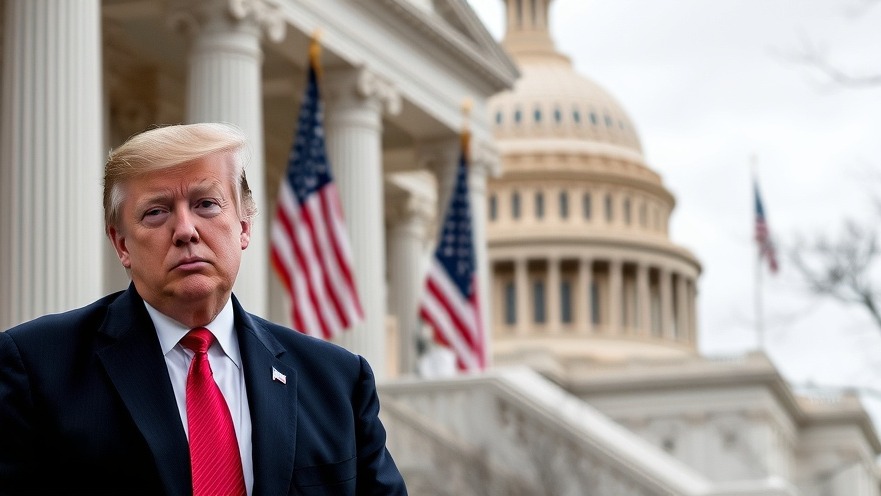
The Government Shutdown: A Politically Charged Standoff
The U.S. government officially shut down as midnight struck on October 1st, 2025, marking a significant inflection point in American politics. The impasse resulted from an inability among Congress and President Trump’s administration to reach a funding agreement, underscoring deep partisan divisions that have characterized contemporary governance.
In this particular instance, Trump’s Republican Party, despite holding a majority in both chambers of Congress, found it impossible to procure support from Democrats, who are demanding healthcare policy changes. With each party blaming the other for the stalemate, this shutdown has thrust over 750,000 federal workers into uncertainty, as they face furloughs and delayed paychecks.
Historical Context: The Weight of Previous Shutdowns
Ten years after a crippling 35-day shutdown during Trump’s first term, this event serves as a harsh reminder of what’s at stake. Shutdowns, especially prolonged ones, have historically impacted federal workers, funding for critical programs, and public services that citizens rely on daily, from healthcare to national parks:
During the last shutdown, many government services ceased entirely, creating hardships for countless Americans.
Public services deemed non-essential were halted, leaving citizens and staff scrambling for support while essential services faced budgetary impacts.
The Stakes: Vital Health Care Policies on the Line
The current confrontation hinges not just on budgetary allocations but also on more profound issues surrounding healthcare security. Democrats have made a strong case for the necessity of funding to maintain health-related benefits as vital packages are set to expire:
Without bipartisan agreement, services including Medicare and Medicaid could see serious alterations, impacting countless citizens economically and socially.
Senate Democratic leaders assert that withholding these healthcare provisions puts the health and well-being of millions at risk.
Public Sentiment: Who Will Bear the Blame?
As more Americans face the brunt of a government shutdown, public perception starkly varies concerning accountability. Polling data reveals that a majority of voters might attribute the fault primarily to the Democrats; however, ongoing narratives from both sides aim to shift blame, complicating public sentiment on who bears the responsibility:
Trump supporters and many Republicans believe that the Democrats are holding essential government services hostage for their political gain.
Conversely, Democrats maintain that Republicans are exploiting the situation to further ideological goals at citizens' expense.
Impact on Federal Services: A Future in Limbo
The implications of a prolonged shutdown are far-reaching, not only leading to layoffs but also delaying crucial government functions:
Federal employees who are deemed “non-essential” will find themselves furloughed without pay, while essential personnel continue to work, albeit with uncertainty regarding their compensation.
For instance, the U.S. Transportation Security Administration (TSA) and air traffic controllers are among those who continue duties without guaranteed payment, prompting safety concerns amid flight delays.
Local Community Impact: Dallas Responds to Uncertainty
As the effects of the shutdown ripple through various sectors, residents of Dallas grapple with its local implications:
City services may face disruption, while local businesses could see a decline in revenue due to overall economic uncertainty.
Community outreach programs focusing on healthcare and social services may hit roadblocks, leaving many vulnerable families in a precarious position.
Looking Ahead: The Path To Resolution
With both sides entrenched in their positions, finding common ground could be a monumental challenge. As negotiations proceed, the stakes remain dire for the multitude of federal employees and the public accessing vital services:
Lawmakers prepare for further votes to address the budgetary deadlock, aware that the clock ticking each day incurs serious economic repercussions.
Continued political posturing may inhibit dialogue; however, the urgency for a resolution grows by the day as programs crucial to citizens hang in the balance.
As the shutdown endures, public pressure may ultimately compel Congress to rediscover compromise, lest the longer-term impacts irreversibly alter essential government functions.
Call to Action
This unfolding crisis merits close attention. As citizens of Dallas and beyond navigate the uncertainties introduced by the shutdown, engaging in local politics and advocating for public candor can be a step toward fostering a solution. Consider contacting your representatives to express your concerns, share your story, or ask about their plans. Keeping open the channels of communication is crucial for resolving the divisiveness affecting our nation today.
 Add Element
Add Element  Add Row
Add Row 



Write A Comment